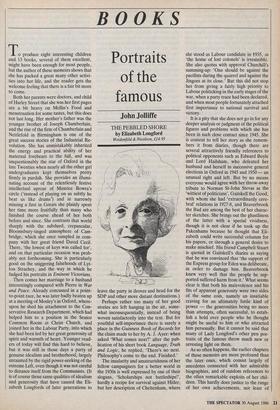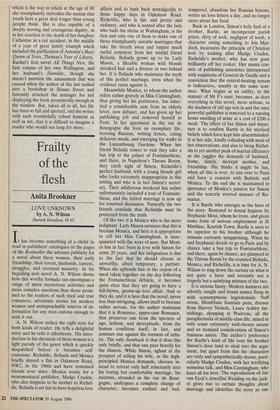BOOKS
To produce eight interesting children and 13 books, several of them excellent, might have been enough for most people, but the author of these memoirs shows that she has packed a great many other activi- ties into her life, and the reader gets the welcome feeling that there is a fair bit more to come.
Both her parents were doctors, and child of Harley Street that she was her first pages are a bit heavy on Mellin's Food and menstruation for some tastes, but this does not last long. Her mother's father was the younger brother of Joseph Chamberlain, and the rise of the firm of Chamberlain and Nettlefold in Birmingham is one of the great success stories of the Industrial Re- volution. She has unmistakably inherited the energy and practical ability of her maternal forebears to the full, and was unquestionably the star of Oxford in the late Twenties when nearly all the other girl undergraduates kept themselves pretty firmly in purdah. She provides an illumi- nating account of the relentlessly festive intellectual uproar of Maurice Bowra's circle (`instead of playing on us subtly he beat us like drums') and in narrowly missing a first in Greats she plainly spent her time more fruitfully than many who finished the course ahead of her both before and since. She contrasts that world sharply with the subdued, crepuscular, Bloomsbury-tinged atmosphere of Cam- bridge, which she once sampled in com- pany with her great friend David Cecil. There, 'the lowest of keys was called for', and on that particular occasion was prob- ably not forthcoming. She is particularly good on the sniggering falsehoods of Lyt- ton Strachey, and the way in which he fudged his portraits in Eminent Victorians.
Then comes her marriage to a husband interestingly compared with Pierre in War and Peace. Already concussed in a point- to-point race, he was later badly beaten up at a meeting of Mosley's in Oxford, where- upon he shed his attachment to the Con- servative Research Department, which had helped him to a position in the Senior Common Room at Christ Church, and joined her in the Labour Party, into which she had been led by her great generosity of spirit and warmth of heart. Younger read- ers of today will find this hard to believe, but it was still in those days a party of genuine idealism and brotherhood, largely untainted by the rigid power-seeking of the extreme Left, even though it was not careful to distance itself from the Communists. (It is of course those same qualities of idealism and generosity that have caused the Eli- zabeth Longfords of later generations to
Portraits of the famous
John Jolliffe
THE PEBBLED SHORE by Elizabeth Longford Weidenfeld & Nicolson, £14.95
leave the party in droves and head for the SDP and other more distant destinations.) Perhaps rather too many of her good stories are left hanging in the air, some- what inconsequentially, instead of being woven satisfactorily into the text. But for youthful self-importance there is surely a place in the Guinness Book of Records for the claim made to her by A. J. Ayer: when asked 'What comes next?' after the pub- lication of his short book Language, Truth and Logic, he replied, 'There's no next. Philosophy's come to the end. Finished.'
The insularity and amateurishness of her fellow campaigners for a better world in the 1930s is well expressed by one of their slogans, 'Scholarships not battleships1', hardly a recipe for survival against Hitler; but her description of Cheltenham, where she stood as Labour candidate in i935, as `the home of lost colonels' is irresistible. She also quotes with approval Churchill's summing-up: 'One should be against the pacifists during the quarrel and against the Jingoes at its close.' But this did not stop her from giving a fairly high priority to Labour politicking in the early stages of the war, when a party truce had been declared, and when most people fortunately attached first importance to national survival and victory.
It is a pity that she does not go in for any deeper analysis or judgment of the political figures and problems with which she has been in such close contact since 1945. She is content to tell her story as she remem- bers it from diaries, though there are several attractively friendly references to political opponents such as Edward Boyle and Lord Hailsham, who defeated her husband and herself in successive general elections in Oxford in 1945 and 1950 — an unusual right and left. But by no means everyone would agree with her throw-away tribute to Norman St-John Stevas as the `wittiest of politicians'. Gaitskell the Good, with whom she had 'extraordinarily cere- bral' relations in 1927-8, and Beaverbrook the Bad are among the best of her charac- ter sketches. She brings out the ghastliness of the latter with a special vividness, though it is not clear if he took up the Pakenhams because he thought that Eli- zabeth could write successful columns for his papers, or through a general desire to make mischief. His friend Campbell Stuart is quoted in Gaitskell's diaries as saying that he was convinced that 'the support of the Express group for Eden was deliberate, in order to damage him. Beaverbrook knew very well that the people he sup- ported suffered harm from it.' What seems clear is that both his malevolence and his fits of apparent generosity were two sides of the same coin, namely an insatiable craving for an ultimately futile kind of power — the generosities being no more than attempts, often successful, to estab- lish a hold over people who he thought might be useful to him or who attracted him personally. But it cannot be said that many of Lady Longford's other pen por- traits of the famous throw much new or arresting light on them.
As so often happens, the earlier chapters of these memoirs are more profound than the later ones, which consist largely of anecdotes connected with her admirable biographies, and of random references to the often remarkable exploits of her chil- dren. This hardly does justice to the range of her own achievements, not least of which is the way in which at the age of 80 she triumphantly embodies the maxim that youth lasts a great deal longer than young people think. She is also capable of a deeply moving and courageous dignity, as in her reaction to the death of her daughter Catherine in a car accident, in the middle of a year of great family triumph which included the publication of Antonia's Mary Queen of Scots, Thomas's Year of Liberty, Rachel's first novel All Things Nice, the first volume of her own Wellington, and her husband's Humility, though she doesn't mention the amusement that was caused when the author of the last rushed into a bookshop in Sloane Street and furiously attacked the manager for not displaying the book prominently enough in the window. But, taken all in all, her life has been so full and spirited, and she writes with such wonderfully robust humour as well as wit, that it is difficult to imagine a reader who would not long for more.









































 Previous page
Previous page